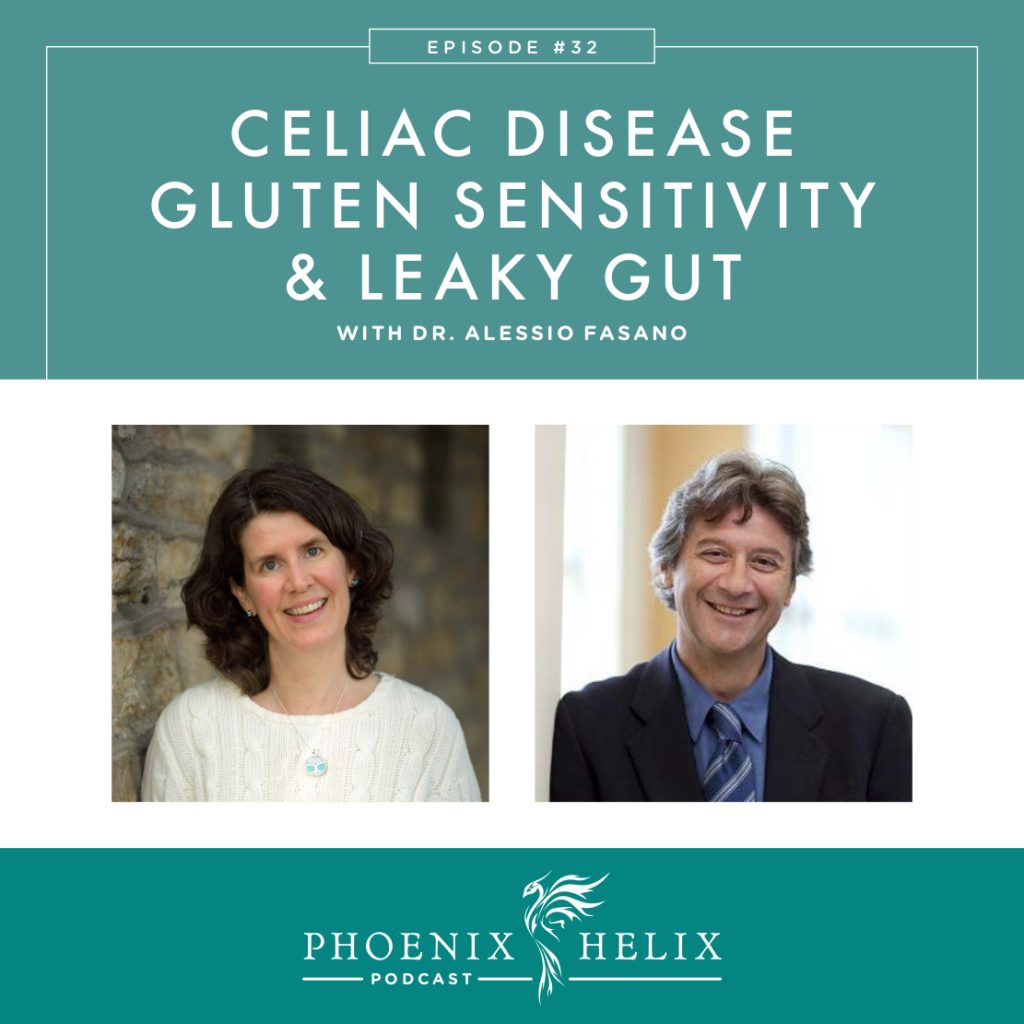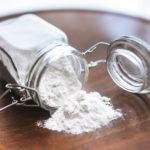The Connection Between Leaky Gut and Autoimmune Disease
Dr. Alessio Fasano is a gastroenterologist and a world-renowned expert on intestinal permeability (aka “leaky gut) and it’s connection to autoimmune disease. In order for autoimmunity to be triggered in the body, three precursors need to take place: (1) genetic vulnerability (2) environmental triggers (3) leaky gut. Then, once autoimmunity is triggered, the body attacks more than just the part associated with the diagnosis (i.e. joints in rheumatoid arthritis, thyroid in Hashimoto’s disease, and skin in psoriasis). It also attacks the intestinal lining, creating a vicious cycle. Today, we’ll learn more about this complex condition and how it affects our autoimmune health.
Dr. Fasano is also an expert on celiac disease, so we’ll learn the difference between celiac and non-celiac gluten sensitivity (NCGS), as well as the difference between gluten cross-reaction and gluten cross-contamination.
Listen to the Show
- Subscribe to my podcast through your favorite podcast app: iTunes, Stitcher, Google, TuneIn, Spotify, Amazon, etc.
- You can also listen to the episode right here through the player below, and if you subscribe to my newsletter you’ll get notified of future episodes.
Podcast: Play in new window | Download
Show Notes
- Intro (0:00)
- Meet Dr. Fasano (0:51)
- A world-renowned gastroenterologist and research scientist, and the author of the book, Gluten Freedom.
- Chief of Pediatric Gastroenterology and Nutrition at MassGeneral Hospital for Children.
- Director of the Center for Celiac Research, specializing in the treatment of patients of all ages with gluten-related disorders, including celiac disease, wheat allergy and gluten sensitivity.
- Director of the Mucosal Immunology and Biology Research Center. Under his leadership, investigators are studying the molecular mechanisms of autoimmune disorders.
- Thank You to our Podcast Sponsor – Paleo on the Go (2:07)
- A frozen meal delivery service, they have a large menu of items for the paleo autoimmune protocol (AIP).
- Use the code PHOENIX for 10% off your first order.
- The Difference Between Celiac Disease and Gluten Sensitivity (2:41)
- Celiac Disease is an autoimmune disease where the body attacks the small intestine, and the trigger for this attack is gluten.
- Gluten Sensitivity is not an autoimmune disease, but it often has symptoms that can overlap with celiac disease. These can include abdominal pain, bloating, skin rashes, joint pain, brain fog, nerve tingling, chronic headaches, chronic constipation or diarrhea.
- Tests and Diagnosis:
- Celiac Disease: Step 1 = Don’t go gluten-free before getting tested. Step 2 = tTG-IgA blood test. You can order this test online, but you need to be eating gluten for it to be accurate. Step 3 = if antibodies show up on the blood test, the diagnosis is confirmed through endoscopy. Seek out a celiac specialist for that procedure.
- Gluten Sensitivity: There is no accurate test currently, so it is a diagnosis based on exclusion. Step 1 = Get tested for celiac. Step 2 = If that test comes back negative, get screened for other possible causes of your symptoms (i.e. other autoimmune diseases or digestive disorders.) Step 3 = Remove gluten from your diet and see if your symptoms improve.
- If you went gluten-free before being tested: Step 1 = Get a genetic test that screens for celiac genes. It’s not a diagnosis, but it lets you know whether it’s possible for you to develop celiac disease. If you have the genes, you then have two choices: (1) Go through a gluten challenge and then take the tTG-IgA blood test. This second option can be quite hard on the body, but it’s the only way to know for sure. (2) Continue to be gluten-free without a diagnosis.
- Gluten Cross-Contamination vs Gluten Cross-Reaction (13:52)
- Gluten Cross-Contamination – When gluten is present in unexpected places – food products, and also kitchen appliances and surfaces.
- Gluten Cross-Reaction – The theory that some other proteins have a similar structure that the body can mis-identify as gluten. Dr. Fasano doesn’t believe this exists. Instead, he thinks the other food reactions are caused by leaky gut.
- What Is Leaky Gut? (18:02)
- The intestinal lining is about 15 feet long. In addition to helping with digestion, these cells serve as a barrier to keep harmful matter out of our bodies. With healthy digestion, all food is broken down to the amino acid level, and those amino acids are allowed through the intestinal wall and become building blocks that our bodies need. With leaky gut, the barrier is no longer tight, and proteins slip through before they are broken down to the amino acid level. The body cannot identify or use these proteins, so they are seen as foreign invaders, and the body mounts an immune and inflammatory response.
- What Causes Leaky Gut? (20:03)
- There are two kinds of leaky gut: (1) Structural: where the intestine has been attacked and damaged, as is the case with celiac disease and inflammatory bowel disorders. (2) Functional: where there is no damage to the intestine, but other factors cause the tight junctions between the intestinal cells to widen.
- How Does Leaky Gut Affect Autoimmune Disease? (22:40)
- Functional leaky gut is a precursor to autoimmune disease. Proteins, bacteria and viruses slip through the intestinal cell junctions, and when the immune system mounts a response, it can trigger autoimmune disease if you have a genetic vulnerability.
- Is There an Accurate Test for Leaky Gut? (26:35)
- No. The best test currently available is the Lactulose/Mannitol Challenge. You drink these two sugars, and their ratio in your urine indicates the presence or absence of leaky gut (lactulose is a large sugar and shouldn’t be able to get through your intestinal lining). The theory is sound, but the practical application is prone to testing errors. They are currently working on developing a simple blood test for another marker (zonulin). That test will be more accurate and hopefully available soon.
- What is Zonulin? (28:53)
- Dr. Fasano was doing research into cholera disease when he accidentally discovered a toxin called zonulin that widens intestinal cell junctions, making the gut leaky. This led him into his research on leaky gut – trying to figure out how zonulin works and how it can be controlled.
- People with autoimmune disease tend to release more zonulin than the average population, making us more prone to leaky gut.
- Larazotide Acetate – a Medication to Treat Leaky Gut (32:10)
- Based on Dr. Fasano’s zonulin discovery, 9 Meters Biopharma, Inc. has been conducting research into a medication that blocks zonulin, thereby sealing leaky gut.
- In the clinical trials so far, the only side effect documented is constipation in some people (which could actually help those with diarrhea-prone IBS that is caused by leaky gut.)
- Research is a very slow and very expensive process. Dr. Fasano discovered Zonulin in the mid-nineties. Larazotide acetate was engineered in 2003. Twelve years and $300 million later, the drug has been tested on 1,000 people, but it is still years away from FDA approval.
- This drug isn’t a cure. Rather it’s a safety net, best used when traveling, at a restaurant, or at a friend’s house – when you can’t control the food and there’s a risk of exposure. This drug would prevent those foods from triggering your symptoms.
- 2019 Update: the phase 3 clinical trial has begun and results are expected in 2021.
- Gluten-Digesting Enzyme Supplements (41:50)
- Dr. Fasano warns against them, because they aren’t proven to work. A recent study showed that the enzyme supplements currently on the market are ineffective at breaking down gluten.
- Can You Cure Leaky Gut? (43:44)
- Many things can cause leaky gut: chemicals in processed food, pollutants, stress, lack of sleep, smoking, excessive alcohol intake, SIBO, and autoimmune disease itself.
- People in the paleo community sometimes talk about “curing” leaky gut, but it’s a dynamic process, affected by what we are exposed to every day. The best way to keep those intestinal junctions tight is to live the paleo diet and lifestyle fully for optimal health, addressing all the areas that cause leaky gut on a daily basis. The same things that are good for autoimmune health are also good for intestinal health.
- Research into the Microbiome and Autoimmune Disease (51:21)
- The same things that cause leaky gut also change our microbiome, and our microbiome strongly influences which genes are turned on and off. The goal of this research is to learn which bacteria are connected to which autoimmune diseases, so we can change the microbiome to turn autoimmunity off again. It’s very new research – too soon to have any answers, but its potential is exciting.
- Dr. Fasano and his team are conducting their studies using celiac disease as a model, through the Mucosal Immunology and Biology Research Center.
- Resource: Ep. 133 The Gut Microbiome with Dr. Lucy Mailing.
- Probiotic Supplements vs. Fermented Foods (56:05)
- For probiotics to be effective, they need to be customized for each person’s needs, and right now, the research isn’t there yet. The supplements currently being sold are the same strains for everyone. A huge mistake was made with the overuse of antibiotics. Dr. Fasano fears that a similar mistake is being made with the overuse of mass-produced probiotics today.
- Dr. Fasano does, however, see the value of probiotics that are a natural component of fermented foods like sauerkraut, yogurt, etc. He thinks these are a good component of a healthy diet.
- Outro (59:15)
- You can stay up to date with Dr. Fasano’s research through the Center for Celiac Research. You can also follow the center on Facebook and Twitter.
- Eileen (your podcast host) is the author of multiple books, written to help people thrive with autoimmune disease. Learn more on the Books Page.
- If you like this podcast, follow or subscribe through your favorite podcast app. You can also subscribe to Eileen’s biweekly newsletter.
- Check out the entire archive of podcast episodes.
You May Also Be Interested In
Spreading the Word
If you like the podcast, please leave a positive review in iTunes. It would mean the world to me, and also helps others find the podcast. Here are some quick instructions using your iPhone:
- If you are already subscribed to my podcast: (1) Click the purple podcast icon. (2) At the bottom of the screen, click Library. (3) At the top of the screen, click Shows. (4) Click the Phoenix Helix podcast image. (5) Scroll down the page, and you’ll see Ratings and Reviews. Scroll down a little bit more and click on Write a Review. This will bring up the review screen. Tap 5 stars (if you love the podcast), and then click in the title box, and it will bring up the keyboard. Enter a title and short review. (6) Click Send in the upper right corner. (7) Thank you! Positive reviews give the podcast a higher search ranking in iTunes, helping people find it and letting them know it’s a quality podcast and worth their time to listen.
- If you haven’t subscribed to my podcast: (1) Click the purple podcast icon. (2) In the lower right corner, click the magnifying class. (3) Type Phoenix Helix in the search box. (4) Click the podcast cover in the Show list. (5) If you’d like to subscribe, click the + sign at the top of the screen. (6) To write a review, scroll down the page, and you’ll see Ratings and Reviews. Scroll down a little bit more and click on Write a Review. This will bring up the review screen. Tap 5 stars (if you love the podcast), and then click in the title box, and it will bring up the keyboard. Enter a title and short review. (7) Click Send in the upper right corner. (8) Thank you! Positive reviews give the podcast a higher search ranking in iTunes, helping people find it and letting them know it’s a quality podcast and worth their time to listen.










Thanks Phoenix! A scientifically sound piece, much appreciated for a fellow auto! P
You’re welcome! I’m so glad you found it helpful.
Really interesting. Thank you.
You’re welcome, Dawn.
Loved this episode. It helped me better understand intestinal permeability (the how, the why, and the who) in relation to my autoimmune conditions Crohn’s disease and colitis.
Thank you!
Amanda Comstock
You’re welcome, Amanda! Thanks for taking the time to comment. Wishing you health in every way.
Thank you so much for the podcast and this very important episode. I’m only one month into the AIP, so I’m still learning all of this new info. I have MS and I’m sure I can pinpoint the leaky gut triggers. It’s good to get some understanding of what is happening and whether there is hope. I appreciate the show notes so much, too. It’s great to have for reference and review.
You’re welcome, Corianna. There’s so much to discover about our bodies, isn’t there?
So thankful once more for your posts and particularly this interview! I’ve been taking LDN for PMR and IBD….the pain of PMR is much reduced but the diarrhea and loose stool problem has been unchanged. I’m discouraged but this helps me see the Connection to my celiac & leaky gut ( after 2 bouts of Cdiff and 2 episodes of food poisoning, I think my gut is trashed!) being 76, it is difficult to cope with all this….often wonder how much my body can take. But your info always brings encouragement!
I’m happy to be your encourager on any day you’re feeling down! I admire you so much, Sunny. Celebrate every improvement, and don’t give up.
Awww, shucks!
I absolutely loved this episode. Being an immunologist pre-kids, and now diagnosed with Sjogren’s and Myasthenia Gravis, I love that you bring on the experts and have such in depth discussions with them. THANK YOU!
You’re welcome, Sybil. It’s such a privilege to talk with these experts. I learn something every time!